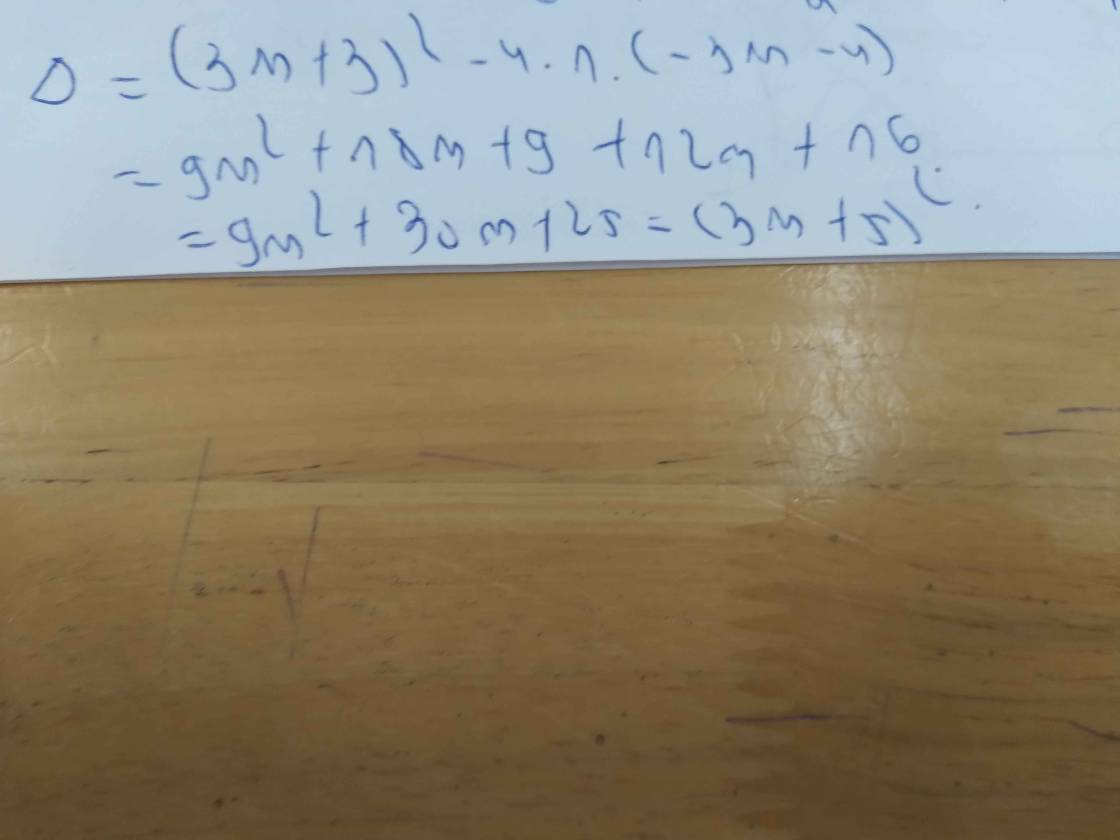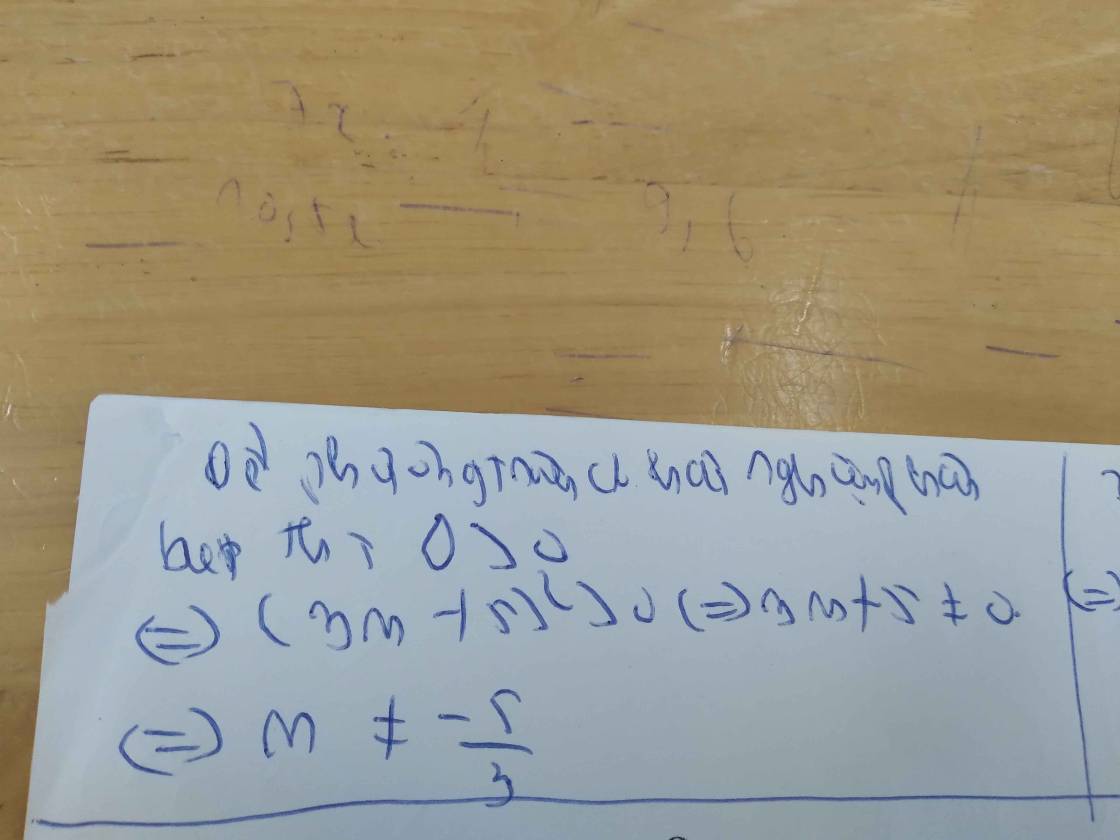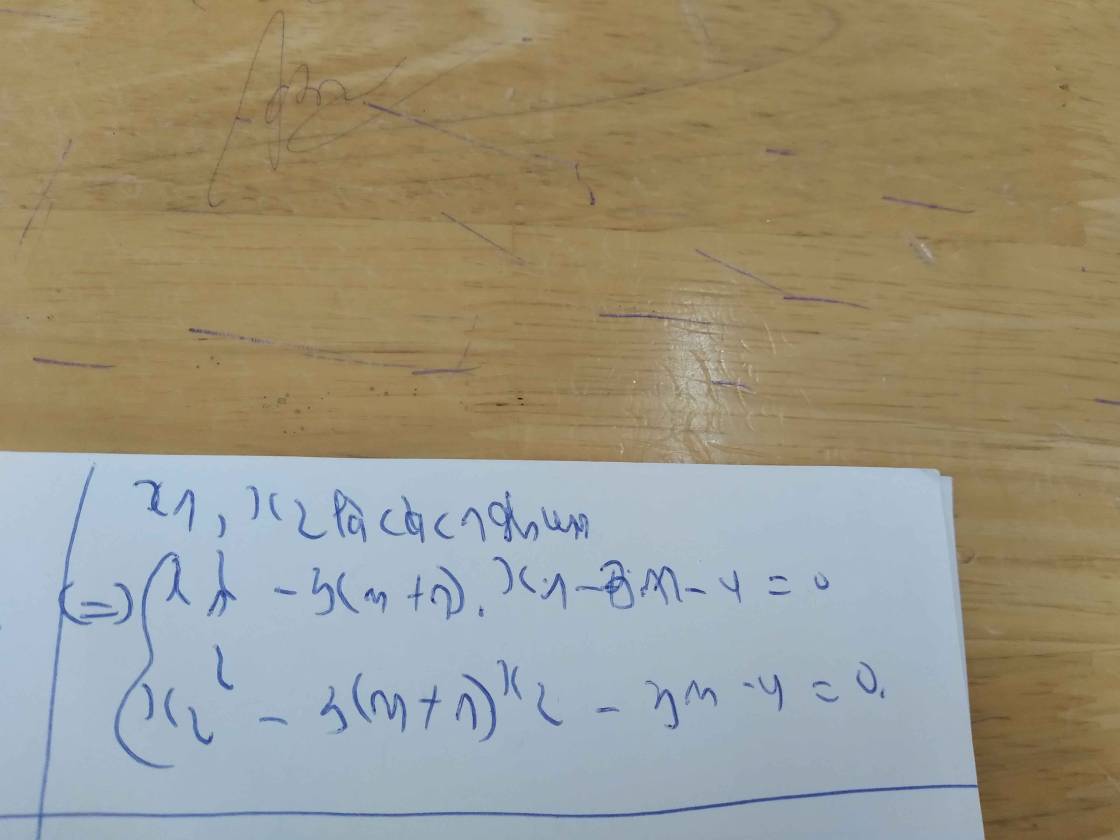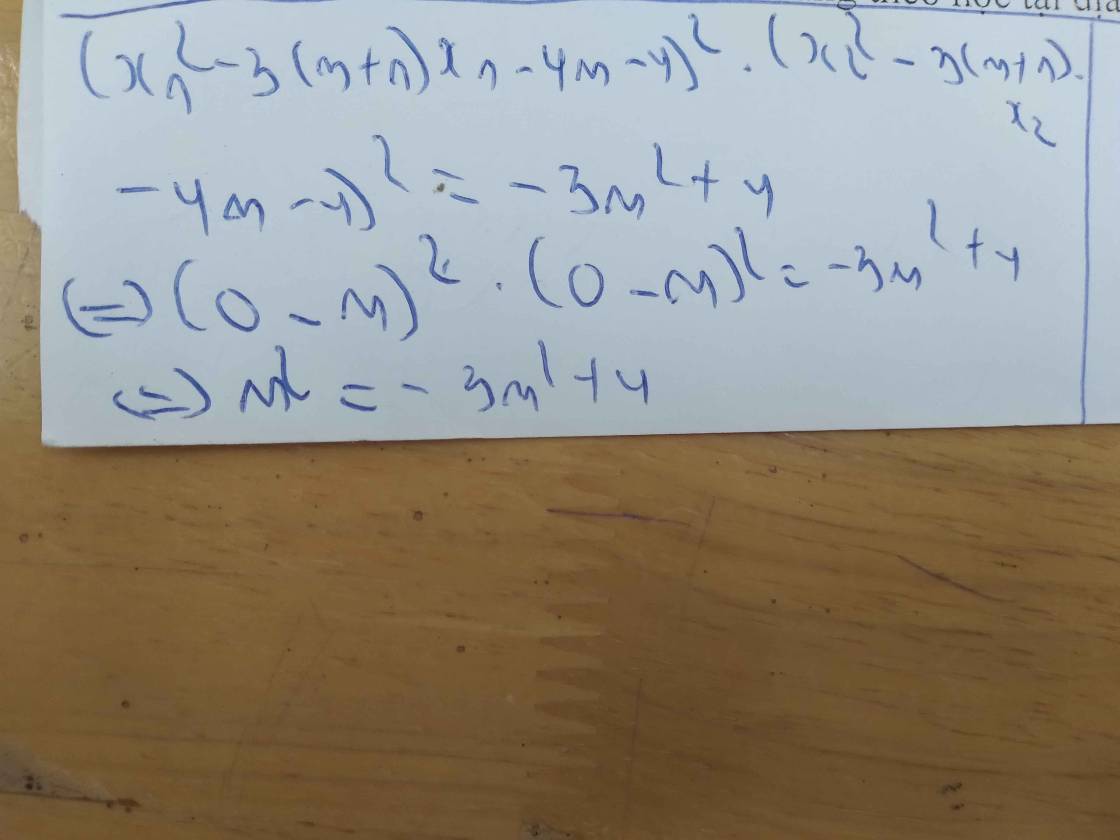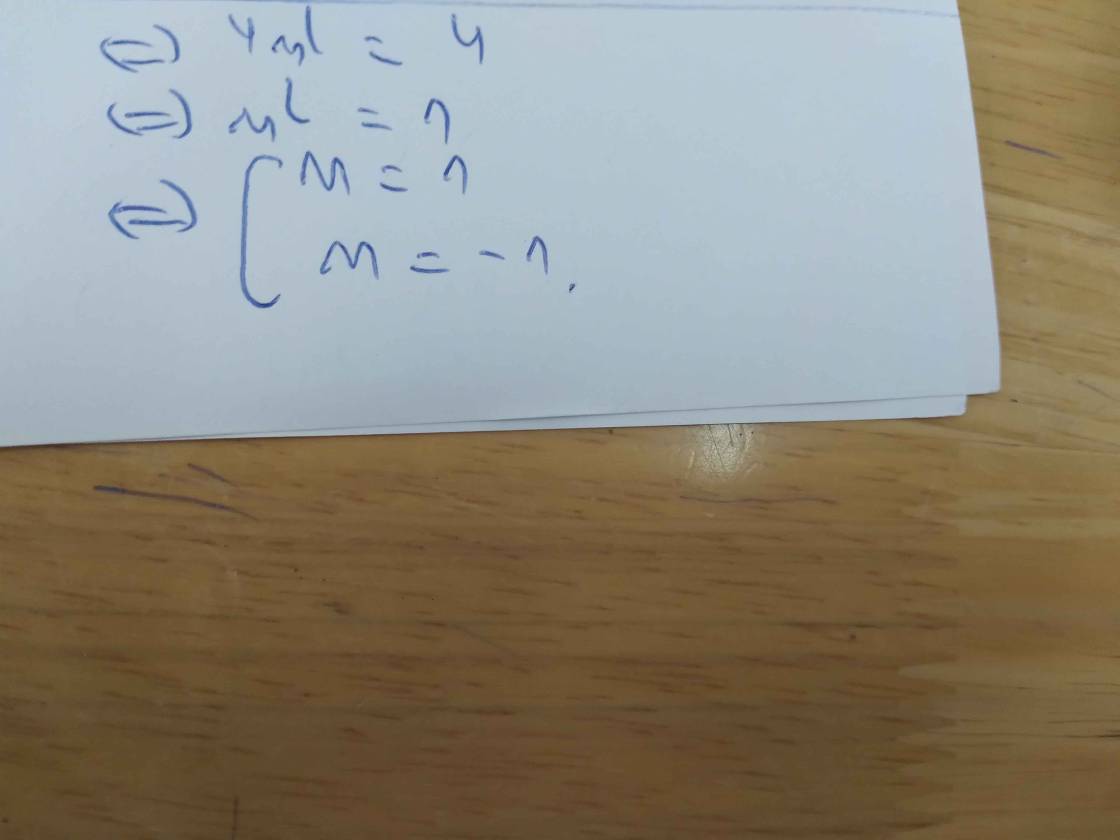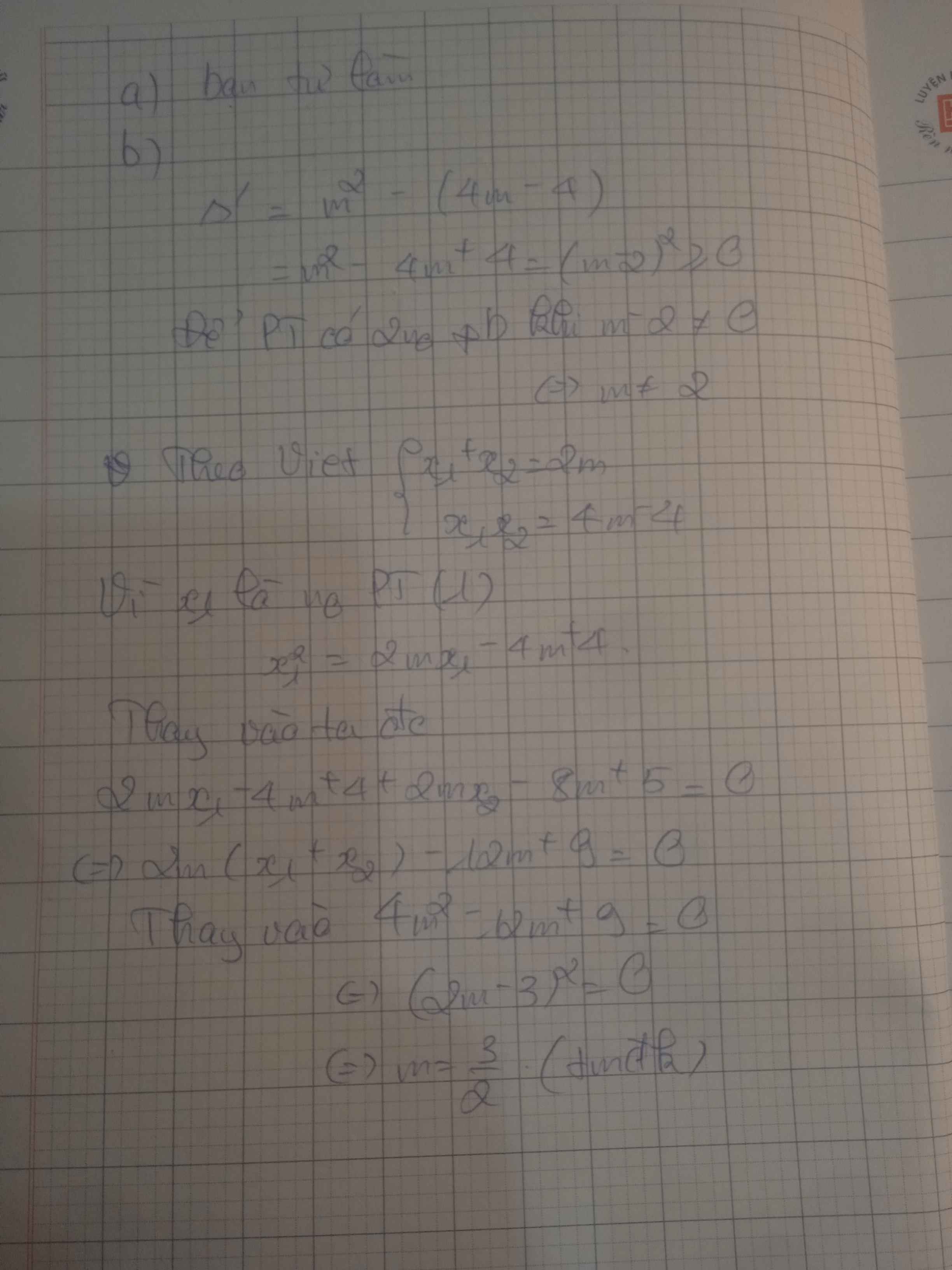Hãy nhập câu hỏi của bạn vào đây, nếu là tài khoản VIP, bạn sẽ được ưu tiên trả lời.

a: Khi m=1 thì (1): x^2-2(1-2)x+1^2-5-4=0
=>x^2+2x-8=0
=>(x+4)(x-2)=0
=>x=2 hoặc x=-4
b: Δ=(2m-4)^2-4(m^2-5m-4)
=4m^2-16m+16-4m^2+20m+16
=4m+32
Để pt có hai nghiệm phân biệt thì 4m+32>0
=>m>-8
x1^2+x2^2=-3x1x2-4
=>(x1+x2)^2+x1x2+4=0
=>(2m-4)^2+m^2-5m-4+4=0
=>4m^2-16m+16+m^2-5m=0
=>5m^2-21m+16=0
=>(m-1)(5m-16)=0
=>m=16/5 hoặc m=1

\(x^2-2\left(m-1\right)x+m^2-4=0\)
\(\Delta=b^2-4ac=\left[-2\left(m-1\right)\right]^2-4\left(m^2-4\right)\)
\(=4\left(m^2-2m+1\right)-4\left(m^2-4\right)\)
\(=4m^2-8m+4-4m^2+16\)
\(=-8m+20\)
Để pt đã cho có 2 nghiệm pb \(x_1,x_2\) thì \(\Delta>0\Leftrightarrow-8m+20>0\Leftrightarrow-8m>-20\Leftrightarrow m< \dfrac{5}{2}\)
Theo Vi-ét, ta có :
\(\left\{{}\begin{matrix}x_1+x_2=-\dfrac{b}{a}=2\left(m-1\right)\\x_1x_2=\dfrac{c}{a}=m^2-4\end{matrix}\right.\)
Ta có : \(x_1\left(x_1-3\right)+x_2\left(x_2-3\right)=6\)
\(\Leftrightarrow x_1^2-3x_1+x^2_2-3x_2=6\)
\(\Leftrightarrow\left(x_1^2+x_2^2\right)-3\left(x_1+x_1\right)-6=0\)
\(\Leftrightarrow\left(x_1+x_2\right)^2-2x_1x_2-3\left(x_1+x_2\right)-6=0\)
\(\Leftrightarrow\left(2m-2\right)^2-2\left(m^2-4\right)-3\left(2m-2\right)-6=0\)
\(\Leftrightarrow4m^2-8m+4-2m^2+8-6m+6-6=0\)
\(\Leftrightarrow2m^2-14m+12=0\)
\(\Leftrightarrow\left\{{}\begin{matrix}m=6\left(ktm\right)\\m=1\left(tm\right)\end{matrix}\right.\)
Vậy m = 1 thì thỏa mãn đề bài.

\(\Delta=\left(2m+4\right)^2-4\left(3m+2\right)\)
\(=4m^2+16m+16-12m-8\)
\(=4m^2+4m+8\)
\(=\left(2m+1\right)^2+7>0\)
Do đó: Phương trình luôn có hai nghiệm phân biệt
Theo Vi-et, ta được:
\(\left\{{}\begin{matrix}x_1+x_2=2m+4\\x_1x_2=3m+2\end{matrix}\right.\)
Theo đề, ta có hệ phương trình:
\(\left\{{}\begin{matrix}x_1+x_2=2m+4\\-2x_1+x_2=3\end{matrix}\right.\Leftrightarrow\left\{{}\begin{matrix}3x_1=2m+1\\x_1+x_2=2m+4\end{matrix}\right.\Leftrightarrow\left\{{}\begin{matrix}x_1=\dfrac{2}{3}m+\dfrac{1}{3}\\x_2=2m+4-\dfrac{2}{3}m-\dfrac{1}{3}=\dfrac{4}{3}m+\dfrac{11}{3}\end{matrix}\right.\)
Ta có: \(x_1x_2=3m+2\)
nên \(\left(\dfrac{2}{3}m+\dfrac{1}{3}\right)\left(\dfrac{4}{3}m+\dfrac{11}{3}\right)=3m+2\)
\(\Leftrightarrow m^2\cdot\dfrac{8}{9}+\dfrac{22}{9}m+\dfrac{4}{9}m+\dfrac{11}{9}=3m+2\)
\(\Leftrightarrow m^2\cdot\dfrac{8}{9}-\dfrac{1}{9}m-\dfrac{7}{9}=0\)
\(\Leftrightarrow8m^2-m-7=0\)
\(\Leftrightarrow\left(m-1\right)\left(8m+7\right)=0\)
=>m=1 hoặc m=-7/8

a) Thay m=0 vào phương trình (1), ta được:
\(x^2-2\cdot\left(0-1\right)x+0^2-3m=0\)
\(\Leftrightarrow x^2+2x=0\)
\(\Leftrightarrow x\left(x+2\right)=0\)
\(\Leftrightarrow\left[{}\begin{matrix}x=0\\x+2=0\end{matrix}\right.\Leftrightarrow\left[{}\begin{matrix}x=0\\x=-2\end{matrix}\right.\)
Vậy: Khi m=0 thì S={0;-2}

a. Thay m=1 vào pt ta được: \(x^2+2x=0\Leftrightarrow\left[{}\begin{matrix}x=0\\x=-2\end{matrix}\right.\)
b, Để pt có hai nghiệm pb \(\Leftrightarrow\Delta>0\)
\(\Leftrightarrow4-4\left(m-1\right)>0\Leftrightarrow m< 2\)
Theo hệ thức viet: \(\left\{{}\begin{matrix}x_1+x_2=-2\\x_1x_2=m-1\end{matrix}\right.\)
Có \(x_1^3+x_2^3-6x_1x_2=4\left(m-m^2\right)\)
\(\Leftrightarrow\left(x_1+x_2\right)^3-3x_1x_2\left(x_1+x_2\right)-6x_1x_2=4\left(m-m^2\right)\)
\(\Leftrightarrow-8+6\left(m-1\right)-6\left(m-1\right)=4\left(m-m^2\right)\)
\(\Leftrightarrow4m^2-4m-8=0\)
<=>\(\left[{}\begin{matrix}m=2\left(L\right)\\m=-1\left(Tm\right)\end{matrix}\right.\)
Vậy m=-1

\(\Delta=\left(-m\right)^2-2.1.\left(m-1\right)\\ =m^2-2m+1\\ =\left(m-1\right)^2\)
Phương trình có hai nghiệm phân biệt :
\(\Leftrightarrow\Delta>0\\ \Rightarrow\left(m-1\right)^2>0\\ \Rightarrow m\ne1\)
Theo vi ét :
\(\Leftrightarrow\left\{{}\begin{matrix}x_1+x_2=m\\x_1x_2=m-1\end{matrix}\right.\)
\(x^2_1+x^2_2=x_1+x_2\\ \Leftrightarrow x^2_1+x^2_2=m\\ \Leftrightarrow\left(x^2_1+2x_1x_2+x_2^2\right)-2x_1x_2=m\\ \Leftrightarrow\left(x_1+x_2\right)^2-2x_1x_2-m=0\\ \Leftrightarrow m^2-2\left(m-1\right)-m=0\\ \Leftrightarrow m^2-2m+2-m=0\\ \Leftrightarrow m^2-3m+2=0\\ \Leftrightarrow\left[{}\begin{matrix}m=1\left(loại\right)\\m=2\left(t/m\right)\end{matrix}\right.\)
Vậy \(m=2\)
